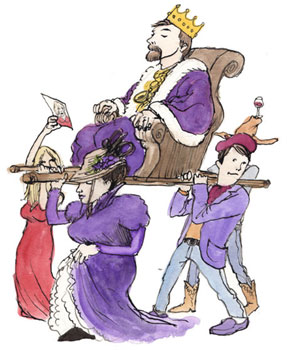
 Cabernet Sauvignon
Cabernet Sauvignon
All hail the King! But a king doth not a gentleman make. A temperamental prince in youth, you’re a thick-skinned brat with a bitter chip on your shoulder. The air of nobility only develops after a decade or more banished to a dark cellar. Your Bordeaux caretakers warned others of your tannic nature, but the image makers of California left you to your own devices. They spent decades of constant frustration trying to calm your aggressive nature. Finally heeding the advice of the Bordelaise, your New World guardians now employ the services of your perfumy cousin Cabernet Franc to teach you grace, and the sultry French consort Merlot, to teach you maturity. At last, your time has come. In a royal manner, you now rule over North America in a court known as ‘Meritage’.
Appellations Growing Cabernet Sauvignon Grapes
Appellations producing the most Cabernet Sauvignon wines:
Cabernet Sauvignon Grape Details
 Cabernet Sauvignon (aka. Bouche, Bouchet, Petit-Bouchet, Petit-Cabernet, Petite Vidure, Sauvignon Rouge, Vidure)
Cabernet Sauvignon (aka. Bouche, Bouchet, Petit-Bouchet, Petit-Cabernet, Petite Vidure, Sauvignon Rouge, Vidure)
Cabernet Sauvignon's California acreage has rocketed upward over the last four decades, soaring to 40,000 acres (and growing) from only 600 acres in the early 1960s. In California, and elsewhere, Cabernet Sauvignon has brilliantly adapted to much different climactic conditions than those of its rather temperamental and marginal Bordeaux homeland. Few would argue with the proposition that Cabernet Sauvignon is the noblest of all grape varieties, and, unquestionably, along with Chardonnay it is the world’s most marketable wine variety. It is this marketability -- more than any real sense of ecological fit -- that explains Cabernet Sauvignon’s spread to red wine regions around the globe. Renowned for its high levels of extract and tannin, with classic cassis and cedar characteristics, Cabernet Sauvignon also deserves its reputation for great longevity. This grape has actually been called “the varietal without faults.” However, this is not totally true. Young wines made solely from this varietal are tightly structured, with unforgiving tannins. Knowing this, the vignerons of Bordeaux have long understood the need to blend Cabernet Sauvignon with complementary varieties, like Merlot and close cousin Cabernet Franc. This blending adds complexity and makes the wine more accessible. In California, it was not until well into the 1970s that winemakers began to recognize the merits of such blending, frustrated perhaps with the still-overpowering character of 100% Cabernet Sauvignon even after a decade of bottle age...and still "going strong"! The current popularity of California ‘Meritage’ blends reflects New World winemakers’ belated understanding of what Cabernet Sauvignon needs to excel.
Feature In
 Stags Leap District ~ Napa Valley
Stags Leap District ~ Napa ValleyStags Leap District's
20th Anniversary Reveals its Appellation Distinctiveness By Dan Berger









